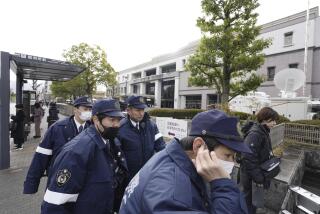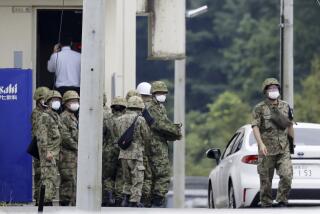Alleged Japanese Mafia Gunman Injures 2 in Station
- Share via
TOKYO — A Japanese gangster opened fire Friday afternoon in a crowded train station in the city of Kobe, injuring a commuter, after he was caught trying to peek under a woman’s skirt, according to police. A policeman also was injured.
The incident, which occurred at rush hour, was unsettling in a nation where guns are rare and crime rates low by international standards.
“I commute every day by train at peak time,” said Kaori Sano, a 32-year-old office worker living in Tokyo. “For someone to take out a gun and shoot is unbelievable. It’s really dangerous--it feels like nothing is secure these days.”
The suspect, 52-year-old Masakazu Kubota, was spotted by police on an escalator in Kobe’s Sannomiya station using a mirror to try to look under a young woman’s skirt, said an official with the Hyogo Prefecture Police Department.
According to the authorities’ account, when police moved in to arrest Kubota, he pulled a gun out of a nylon bag and fired a shot at the ground. The officers tried to wrestle the weapon away from him, but he allegedly used the gun to bludgeon one of them. He fired a second shot, grazing a 57-year-old commuter in the chin before being subdued, police said.
Kubota, an alleged member of the Yamaguchi-gumi crime syndicate, was arrested for attempted murder and illegal possession of a firearm. The victims’ injuries were not life-threatening.
The Kobe and Osaka region is a base for many Japanese mafia, or yakuza, and until about 20 years ago, Japan’s strict gun control laws made firearms rare. But more recently, the number of guns seized or used in crimes has risen sharply, said Masaaki Noda, a professor and criminologist at Kyoto Women’s University.
“Customs officials are not tough enough,” he said. “And you’re seeing more and more guns coming in from Russia and Southeast Asia. The yakuza are now bringing them in all the time.”
What many people found disconcerting about this latest incident was the fact that it appeared to break the yakuza’s own code of behavior. Occasional shootings by yakuza occur, particularly in the Kobe-Osaka area, but they tend to be turf battles between rival gangs--not random shots involving innocent people trying to get home for the weekend.
“I’m from Kobe, and you hear of cases from time to time, but never like this,” said Junko Ueda, a 36-year-old housewife in Tokyo. “To whip out a gun after such a relatively petty crime and shoot it in such an everyday place is really scary. It’s like a movie, except it’s real life.”
Experts say traditional links between the police and yakuza--including an understanding that gangsters will not involve bystanders in gunplay--are under pressure as the economy and society change and rival gangs from China and elsewhere move in. Many of Japan’s laws against organized crime need to be strengthened, some analysts say.
Police, particularly those in the Osaka-Kobe area, traditionally have maintained close ties with gangster groups, Noda said. On the one hand, this allows them to monitor what’s going on. On the other, it breeds collusion. Frequently, police officials at high levels in the Kobe force are suddenly able to build expensive homes, he said.
“The yakuza-police connection is really strong in good and bad ways,” he said. “No one says it’s built with bribes, but this is what’s happening.”
Yakuza members also are under more stress these days along with many others in Japan as the recession eats into their traditional sources of profit.
The word yakuza reportedly comes from the lowest possible score--8-9-3 or ya-ku-sa--in a Japanese card game. Yakuza are common in Japanese movies and trace their origins as far back as 1612, when groups of eccentric samurai and petty hoodlums known as kabuki-mono, or “crazy ones,” gained attention.
Perhaps because of their long history and Japan’s more accommodative culture, experts say, gangsters’ links with the police, right-wing groups, the government and political parties are tolerated and even accepted.
The Yamaguchi-gumi is Japan’s most powerful crime family. Estimates vary, but there are said to be as many as 5,000 groups nationwide with up to 100,000 core members.
*
Rie Sasaki of The Times’ Tokyo Bureau contributed to this report.
More to Read
Sign up for Essential California
The most important California stories and recommendations in your inbox every morning.
You may occasionally receive promotional content from the Los Angeles Times.













